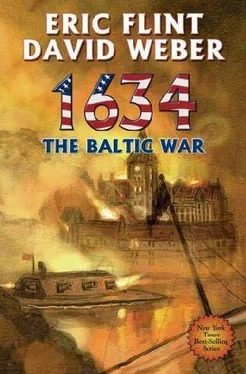Eric Flint - 1634 - The Baltic War
Здесь есть возможность читать онлайн «Eric Flint - 1634 - The Baltic War» весь текст электронной книги совершенно бесплатно (целиком полную версию без сокращений). В некоторых случаях можно слушать аудио, скачать через торрент в формате fb2 и присутствует краткое содержание. Жанр: Альтернативная история, на английском языке. Описание произведения, (предисловие) а так же отзывы посетителей доступны на портале библиотеки ЛибКат.
- Название:1634: The Baltic War
- Автор:
- Жанр:
- Год:неизвестен
- ISBN:нет данных
- Рейтинг книги:5 / 5. Голосов: 1
-
Избранное:Добавить в избранное
- Отзывы:
-
Ваша оценка:
- 100
- 1
- 2
- 3
- 4
- 5
1634: The Baltic War: краткое содержание, описание и аннотация
Предлагаем к чтению аннотацию, описание, краткое содержание или предисловие (зависит от того, что написал сам автор книги «1634: The Baltic War»). Если вы не нашли необходимую информацию о книге — напишите в комментариях, мы постараемся отыскать её.
1634: The Baltic War — читать онлайн бесплатно полную книгу (весь текст) целиком
Ниже представлен текст книги, разбитый по страницам. Система сохранения места последней прочитанной страницы, позволяет с удобством читать онлайн бесплатно книгу «1634: The Baltic War», без необходимости каждый раз заново искать на чём Вы остановились. Поставьте закладку, и сможете в любой момент перейти на страницу, на которой закончили чтение.
Интервал:
Закладка:
Dear God, the girl was smart! Even with her only at the age of seven, on short acquaintance, it was obvious.
"She's adventurous, too," he murmured to himself. The average Danish noblewoman's idea of adventure was wearing a slightly daring new dress. Not learning how to fly-which he'd heard Kristina pestering the pilot about as she got off the airplane.
"What was that?" asked Baldur. "I didn't catch it."
"Never mind. And to hell with the nose. And we'd better start walking more quickly. I'm already going to be late for the congress."
Chapter 68
"Into the new USE province of Westphalia," Axel Oxenstierna droned on, "we propose to include the following: Muenster, Osnabrueck, Schaumburg, Verden, Lippe, Lingen, Bremen, Hoya, Diepholz, and-"
He paused for a moment, here, and Mike Stearns was sure the Swedish chancellor had to force himself not to give King Christian a sharp glance.
"-Holstein."
But, except for a scowl that seemed more ritualistic than heartfelt, Christian IV made no objection. Seated almost across the huge table from Oxenstierna and right next to Gustav Adolf, he simply consoled himself with a royal quaff from his goblet of wine. Which, for its part, was royal-sized.
A bit hurriedly, Oxenstierna went on. "Said province, as we have already agreed, to be administered on behalf of Emperor Gustav II Adolf by Prince Frederik of Denmark."
Here he gave Christian's second oldest son in the line of succession a very friendly smile. The twenty-five-year old prince smiled back, in a semi-friendly manner.
That didn't surprise Mike, however. He was pretty sure that Prince Frederik was still smarting over having been passed over in favor of his younger brother for the really plum position, which was being the quite-likely eventual co-ruler of both the USE and the Union of Kalmar-and Sweden, for that matter, if it turned out that he and Kristina got along well enough. Instead, he was being offered the consolation prize of a newly formed USE province to administer. Yes, yes, it would be a big province, and unless Frederik was hopelessly stupid he'd easily be able to see to it that he was chosen as the permanent ruler once Westphalia was ready for full provincial status instead of being an administered territory. Still, it was very much a consolation prize, and very obviously so.
And why, exactly, had he been passed over? Mike had been told by those in the know that Christian's official excuse to his second-oldest son was that he'd insisted on the youngest of the three brothers because he'd been sure Gustav Adolf would refuse. The youngster in question, of course, being the same fellow who'd inflicted the only major damage on the enemy in the course of the war.
No one was more astonished, went Christian's claim, when the damned Swede had immediately and enthusiastically agreed to have Ulrik betrothed to his daughter-and, of course, it was now too late to do anything about it. No way to withdraw the offer, under the circumstances. As gracious and generally lenient as Gustav Adolf was being about most everything, he was still the victor in the war. You could only take things so far.
The excuse was… plausible enough. But Mike didn't believe it for a minute. Now that he'd finally met Christian IV and had been able to spend some time in his company, a few things had become clear to him.
First, the king was an alcoholic with a truly prodigious capacity for alcohol-but, like some alcoholics Mike had known, he was able to function much better than you'd imagine, at least until he got completely soused.
Second, he could play the buffoon like nobody's business.
Third, most of that was an act. Not all of it, especially when Christian was feeling the wind in his sails. But he was nowhere nearly as foolish as he could sometimes make himself out to be.
There was a fourth thing that Mike was not quite as sure about, but damn near. And that was that by far the most intelligent and capable of the Danish king's three sons in line of succession was the one who resembled Christian the least-his youngest, Prince Ulrik. And he also thought that the king himself knew it.
If he was right, in other words, there had been no error of judgment on Christian's part at all. He'd known, cold-bloodedly, that Gustav Adolf would accept Ulrik as Kristina's betrothed. For two reasons. First, just to close the deal. And second, because that would close it better than anything else.
Like most peoples in Europe in the early seventeenth century, Danes didn't really have a national consciousness yet. The roots of it were there and visible-it was indeed a unified nation and they were indeed its subjects, and accepted the fact willingly-but that still wasn't the same thing as what a later age would call "nationalism." If for no other reason than the inveterate particularism of most people in this era. Any resident of any village or town or city could explain to you in great detail why the inhabitants of a village or town or city maybe forty miles away-twenty miles away, for that matter-were a bunch of dolts with lousy manners, stupid customs, and shaky morals. And watch out, because they'll cheat you in a heartbeat.
All that said, every Dane since the battle in Copenhagen's harbor had adopted Prince Ulrik as their champion. Partly because there hadn't been much else for Danes to cheer about, in the war, and partly because by this point lots of Danes had seen the ironclads for themselves. Crippling and almost sinking one of those seagoing dragons was indeed a prince's business, and only a true prince could have done it.
And…
Obviously the Swedes, dumb and boorish and ill-mannered and criminally-inclined as they might be, were at least smart enough to know it. So, having no prince of their own, they'd turned to the Danes to provide them with one.
As salves for wounded pride went, this one… wasn't bad, actually. It had certainly gone a long way to reconciling the Danes to being frog-marched into Gustav Adolf's Union of Kalmar.
What Mike still didn't know, and could only guess at, was exactly why Christian had made that choice. Did he want his sharpest son in that position to thwart the project, over time? Or did he want him there to make it succeed?
Mike's attention was drawn away from his musings, for a moment, by the sight of the door to the chamber opening. A moment later-speak of the devil-Prince Ulrik himself slipped in and quietly and unobtrusively took a seat among the noblemen and officials watching the proceedings at the big table in ranked chairs along three of the four walls.
His gaze met Mike's for a moment, then slid away. As usual, the prince's expression was noncommittal. He was amazingly hard to read, for someone so young.
Which led Mike to another tentative conclusion, which was that in the long run it really didn't matter why Christian had chosen to act as he had. It would be his son, not he, who would determine how it all shaped up.
Interesting times.
Thankfully, it was also time for a break, and Gustav Adolf had just given the signal. Mike got up and headed for the toilets, after holding Becky's chair for her. She scurried for the toilets faster than he did, not surprisingly. Whatever else was different between the early seventeenth and late twentieth centuries, one thing had remained constant. The line at the women's toilet would move a lot slower than that at the men's.
You wouldn't think so, given how few women were attending the Congress of Copenhagen in an official capacity. But Danish concepts of "official capacity"-and Swedes and Germans were no different-were a lot more relaxed than those of the up-time world. So if, for instance-to take an example present right then and there-the count of Schwarzburg-Rudolstadt, Ludwig Guenther, who'd just celebrated his fifty-third birthday and had been officially invited to the Congress, chose to bring his nineteen-year-old wife and sit beside her, nobody was going to tell him he couldn't.
Читать дальшеИнтервал:
Закладка:
Похожие книги на «1634: The Baltic War»
Представляем Вашему вниманию похожие книги на «1634: The Baltic War» списком для выбора. Мы отобрали схожую по названию и смыслу литературу в надежде предоставить читателям больше вариантов отыскать новые, интересные, ещё непрочитанные произведения.
Обсуждение, отзывы о книге «1634: The Baltic War» и просто собственные мнения читателей. Оставьте ваши комментарии, напишите, что Вы думаете о произведении, его смысле или главных героях. Укажите что конкретно понравилось, а что нет, и почему Вы так считаете.











